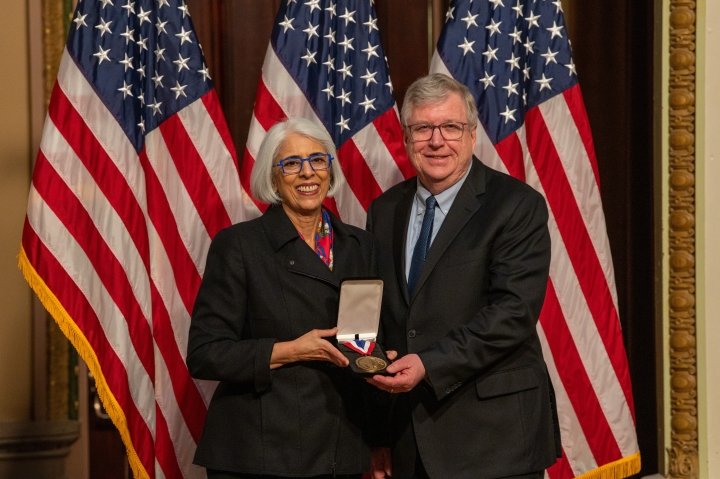Vice Provost for Entrepreneurship and Technology Transfer Eric Fossum was awarded the National Medal of Technology and Innovation at the White House last week, the nation’s highest honor for technological achievement.
The award recognizes his pioneering work in creating digital imaging sensors that power modern cameras, including the ones we carry around in our pockets everyday. Recipients of the National Medal of Science were also recognized at the ceremony.
The National Medal of Technology and Innovation has been bestowed since 1985 by the president to America’s leading innovators. This year, the White House named nine individual awardees of the National Medal of Technology and Innovation, along with two organizations.
“These medalists have made discoveries that are helping us meet the climate crisis, treat crippling disease, create life-saving vaccines, pioneer the way we communicate, and significantly improve our understanding of the universe and our place within it,” the White House said in a statement. “Their accomplishments advance American leadership in science, technology, and innovation, and their work inspires the next generation of American leaders.”

Fossum, the John H. Krehbiel Sr. Professor for Emerging Technologies at Thayer School of Engineering and director of Dartmouth’s PhD Innovation Program, is one of the world’s leading experts in solid-state image sensors. He led the team that invented the complementary metal oxide semiconductor image sensor at the NASA Jet Propulsion Laboratory in the early 1990s.
Created by the team to miniaturize cameras in space, the CMOS “camera on a chip” assembled all the necessary technology to convert light into digital signals on a single chip, which delivered comparable image quality at a fraction of the size and power of previously existing technologies.
Their breakthrough technology revolutionized digital cameras, not just in space but also in consumer electronic products, and is now used in almost all smartphones, webcams, life-saving pill cameras, automobiles, and other devices.
In a video featuring the laureates, Fossum credits his interest in science and innovation to his boyhood enjoyment of the Tom Swift Jr. book series, a set of science fiction adventure novels whose titular character is an inventor.
Fossum also speaks of the importance of collaboration in science and research. “Everybody makes important contributions and has important ideas, and it’s important to have that diversity of opinion about what to do and what to try. So, I’m always grateful to my collaborators,” he says.
Fossum, a Connecticut native, received a bachelor of science degree in physics and engineering from Trinity College, and a PhD in engineering and applied science from Yale in 1984. Prior to his work at the Jet Propulsion Lab, he was a faculty member at Columbia University. After leading several startups, consulting, and co-founding the International Image Sensor Society, he joined Dartmouth in 2010.
Fossum’s groundbreaking work has earned him a long list of accolades, including the Queen Elizabeth Prize and an Emmy Award. Inducted into the National Inventors Hall of Fame in 2011, Fossum is also a member of the National Academy of Engineering; a fellow of the National Academy of Inventors, the IEEE, and the OSA; and was named an AAAS-Lemelson Invention Ambassador by the American Association for the Advancement of Science.
Fossum has been CEO of two companies, Photobit and Siimpel Corporations. He also served as chairman of Gigajot Technology Inc., which he co-founded with two of his former Dartmouth PhD students to develop and commercialize quanta image sensors, a technology they developed at Dartmouth.
Fossum, who was accompanied by his wife, Susan Briggs Fossum, and daughter, Karen Fossum LaRocque, at the White House, says, “I am thrilled to see this technology recognized at the highest national level for its positive impact on society—improving safety, medicine, justice, and overall human well-being through visual communication.”


